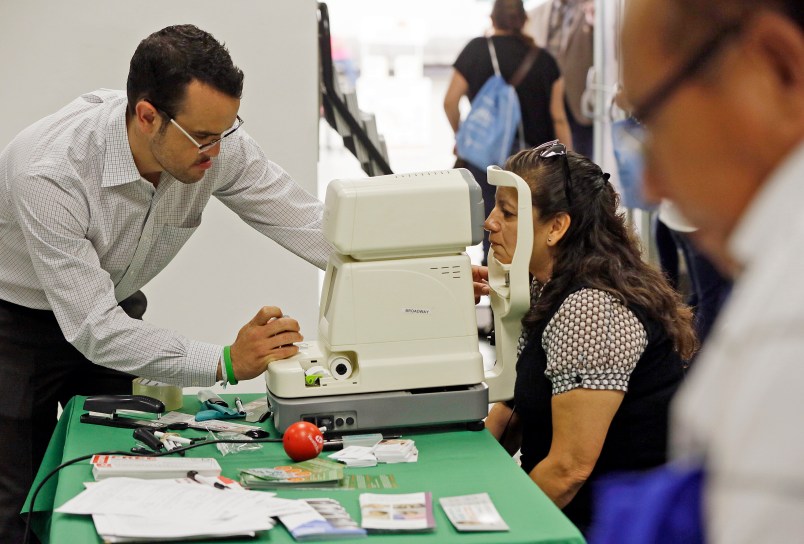SACRAMENTO, Calif. (AP) — President Barack Obama’s executive order to spare some immigrants from deportation has galvanized Democrats, immigration groups and health care advocates in California to push for expanding health coverage to a segment of the population that remains uninsured.
The president’s action excludes immigrants who came to the country illegally from qualifying for federal health benefits. But California has its own policy of providing health coverage with state money to low-income immigrants with so-called “deferred action” that allow them to avoid deportation. Immigrant and health care advocates say that means Obama’s executive order will enable hundreds of thousands of low-income immigrants in California to apply for Medi-Cal, California’s version of Medicaid.
Anthony Wright, executive director of Health Access California, said allowing this expanded group of immigrants to participate in the Medicaid program will enable people to get primary and preventive care, “rather than just at the emergency room.”
The California Department of Health Care Services, however, has yet to receive formal guidance. A state official said it’s too early to tell how the immigration program will impact the overall Medi-Cal program, which is consuming an increasing share of state funds.
Medi-Cal is a health program for the poor paid for by the federal government and the state. It has grown by about 3 million people in California under federal health care reform and now covers more than 11 million Californians, about 30 percent of the state’s population. The federal government is paying for the expansion, but the state will eventually pay 10 percent of additional costs to cover low-income adults, many of whom are childless.
The state is expected to spend more than $17 billion of its own money on the program this year, up 3.5 percent a year ago, according to the Legislative Analyst’s Office.
“We are assessing what some of the potential impacts could be, but it would be premature for us to comment until we have more specific information available,” said Norman Williams, a spokesman for the Department of Health Care Services.
The president’s action has also emboldened a Democratic lawmaker to revive a bill that would provide health coverage to all Californians, regardless of their immigration status.
Sen. Ricardo Lara, D-Bell Gardens, plans to reintroduce his Health4All bill on Monday to open Medi-Cal to immigrants, as well as extending subsidized health benefits in a new insurance marketplace for those without legal status. The proposal, which previously carried a cost as high as $1.3 billion a year, stalled in a legislative committee last cycle and Republicans had criticized the cost of the expansion.
“The president’s action covers almost half of California’s undocumented population, but that still leaves over a million people with no access to health care. We can do better. The bill will cover those remaining uninsured that will not benefit from Obama’s action,” Lara said.
According to the Center for American Progress, a progressive think tank in Washington, D.C., the president’s action lifts the threat of deportation to as many as 1.2 million immigrants living illegally in California. There are an estimated 2.6 million people living illegally in the state.
The issue of benefits for immigrants who are illegally in the United States is a sensitive one.
Joe Guzzardi a spokesman for Californians for Population Stabilization, a Santa Barbara, California-based group that advocates for lower population, said the state is already more generous toward immigrants than most states and adding health coverage may attract more people to cross into California illegally.
“There are millions of Californians who don’t have health care insurance or have to pay for their health care insurance out of their own pockets. So it seems unfair to have legislation that provides for people who came to the United States unlawfully to be rewarded with a health care plan,” Guzzardi said.
Gabrielle Lessard, a health policy attorney with the National Immigration Law Center in Los Angeles, said it will be months before immigrants can apply for the program and fewer will apply or qualify for Medi-Cal. She said it’s also unlikely that immigrants would overwhelm the Medi-Cal system because many would be able to get health coverage through work or school.
Copyright 2014 The Associated Press. All rights reserved. This material may not be published, broadcast, rewritten or redistributed.







Why always leave this on an emotional vs cost basis? Why not cut to the chase that most lawmakers and business people focus on the most–costs and benefits, especially over time–an environmental impact study, if you will? It’s been shown over and over again, for example, that providing the homeless with homes winds up reducing costs to the state/local budgets by huge amounts, such as one I recall that reduced costs from about $30K to $10K per homeless person.
IMO the same would almost certainly be true for health care situations. Not only would health care needs be taken care of earlier at lower costs, but providers would be paid instead of having to operate on emergency/charity budgets. I suggest that crime and policing, homelessness, child delinquency, school dropouts and many other measures would be reduced as well, but I know of no studies in this regard. Not to mention the increase in taxes paid by those who can continue to work because they are in decent health. Well people don’t transmit diseases either, to all those non-“illegals”.
Where are all these measures? We all benefit from such improvements, even if a particular person in one’s view might not “deserve” what they are given.
You are on the right track and it seems very obvious to me as well. There are surely many positives and not just negatives. One of them being, the people are there using the services anyways except in the least financially wise method possible.